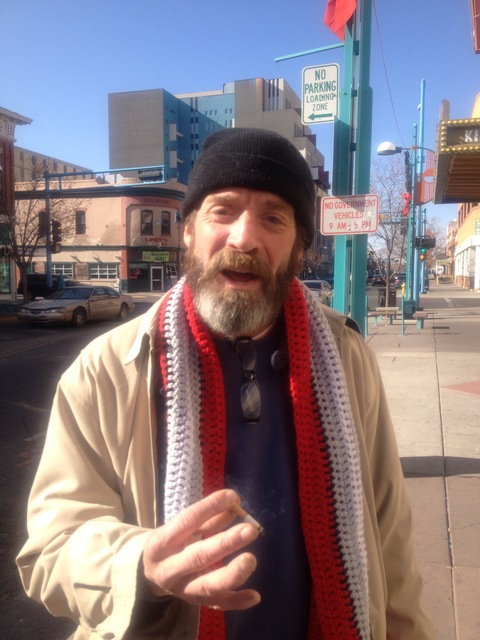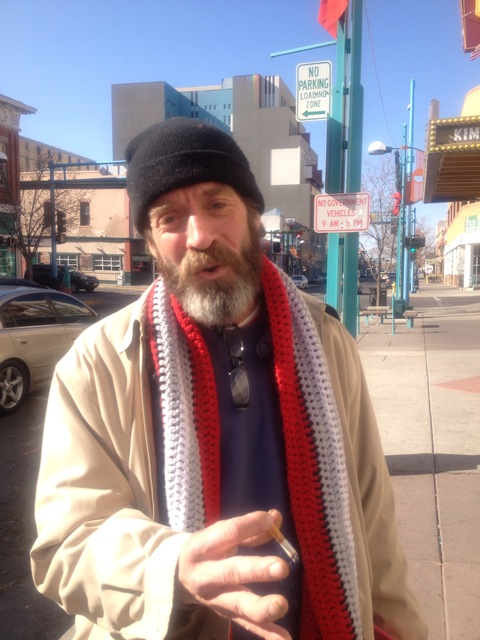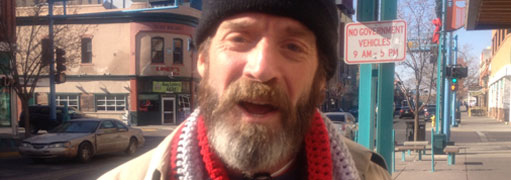Several Sundays ago I was bumbling about the downtown breezeway, standing in lines and taking my turn gathering up the freebies offered to the homeless. At the end of one line stood a man I knew only by face and circumstance. He asked a moment of my time. I obliged. He explained he’d listened-in to one of my diatribes and was intrigued. He thought it worthy of print, suggested I write it down and submit it for publication. I blushed under my beard, thanked him for the flattery and said I would think about it. Over the next couple of weeks I shared the thesis with a number of people: homeless, mission and shelter staff, various general public, college students, and finally the editor of this publication and one of his staff. All encouraged me and at last I committed.Then I froze.Something was missing.In time my friends and then associates began to jab at me: "Have you written it yet? When are you going to write it? You need to write it!"Still, something was missing.Three days before deadline and nearly two weeks after assignment, I finally got it. A friend and I were at the mission waiting on a bus to the shelter along with more than two hundred others. Another Christian movie we’d seen a zillion times was droning on again. We were embroiled in an intense discussion about this very essay on my writer’s block. I was protesting to him, as I gestured to the crowd, that every day these people disappoint me in dozens of ways with their behavior, attitudes and value structures. "How in the hell am I supposed to defend them to the general public?" Just when I’d reminded him my motive was to gently move public perception away from the current stereotype and prejudice, the character John (of Matthew, Mark, Luke and…) was quoting Jesus on the big screen. We’ve all heard the one. "If your enemy is hungry—feed him, if he’s cold—clothe him," and so on."That’s it!" I exclaimed. "You know the Bible-thumping base is already covered—and that’s not my style—but Jesus had it right on that one. He made no conditions. He didn’t say to feed and clothe someone if he’s not a drunk, or a druggie or a ‘bad guy.’ Exactly at what level of bad does a man no longer deserve help? Where is the Bad-O-Meter that allows me to not even try and still have a clear conscience? Who’s qualified to calibrate it?" My friend smiled when he saw me smile. He knew I was back.Later that same evening at the shelter, another friend came to me. He was concerned about what I might be writing. Among a number of examples of bad behavior by the homeless, he told me someone had taken a dump upstairs at the mission (there’s no restroom upstairs at the mission). One hand reflexively slapped to my forehead and head down I groaned, "No, no, no … I can’t write about crap like that." And now I just have—but there’s a reason.Gesturing toward the city, I said, "Look Chris; if I write this and it gets published, I’m gonna get their attention. I’m trying to get it in a positive way—to get them to move toward us with a greater understanding. I see clearly now that when I do, I’m gonna have to get their attention too!" And I was stabbing my finger at the shelter. "That’s exactly what they need,” he said deadpan. "A sense of unity."That was what was missing. Turns out to engage the general public about the homeless, I’ll need to engage the homeless about themselves. To work on one I’ll have to work on both. And now the original thesis.A Single WordIn our language we have many terms for groups of things, for example: a “gaggle” of geese, a “pod” of whales, a “pride” of lions and so on. These terms are called modifiers and are sometimes referred to as cognitive when they evoke a sense of feeling, a location or function—when they become descriptive and beg definition. One example is a “murder” of crows. Why the word murder? Crows fly solo and only band together when they’re all pissed-off at the same thing. So the next time you see a murder of crows…beware.In human terms we also have a bunch of cognitive modifiers: a congregation, a gallery, an audience, a team, a gang, a squad and so on. In conversation, "a congregation of churchgoers" certainly feels different than a "gang of hoodlums." Yet we have no term for the homeless except exactly that— “the homeless.”This is non-discerning and allows anyone any interpretation they wish. It’s nondescript and lacking in intimacy. It leaves out the individual. We all know, in our current social climate, “the homeless” is a negative stereotype fraught with extreme prejudice. The general public uses the term with the same disdain as a racial slur. Therefore, it not only needs, but demands an appropriate modifier.I was pondering this when I walked into the always overcrowded bathroom at St. Martins one morning. I was moving toward my goal amidst the ever-present murmurs of gratuitous “excuse me’s” when a naked Irishman brushed past. He was on his way to the locker-room showers to shower next to a black man, an American Indian, and a younger white guy covered in jail-house tattoos. The row of thrones occupied and equally diverse. The lines for them, the showers and the sinks—all the same. That’s when I knew. Humility. We, the homeless, live in a constant state of humility. And not just in restrooms.We stand in the same lines together in sub-freezing weather to be let in for food, the same lines for clothing or medical care, the same lines for the busses to take us to the shelters to sleep on the same floor. And neither the busses nor the shelters ever keep a schedule except when it’s time for us to go.Men, women, and children of all ages and races come together every day in cooperation and silent support for mutual survival. We watch out for each other. We assist our disabled and our mentally challenged. We open the door for a stranger, guide him, then pick him up if he falls. We share our stories and our hopes and our dreams and in the end…we become honest. Honest with each other as well as ourselves. We admit our failures and our weaknesses aloud. We become in fact humble.So I intend to modify “the homeless" in this way: a “humble” of homeless. The justification lies in our daily existence. Try out a “humble” in conversation at your water coolers and break tables, churches and synagogues, bars and homes. See if it doesn’t beg conversation. See if you don’t find yourself trying to define “the homeless.”I’ll admit I’ve been guilty of a similar prejudice as I have referred to the general public as exactly that: the “general public.” Oops, where’s their modifier? I have two to suggest. Perhaps an “ignorance” of public because they just don’t know, or maybe a “reluctance” of public for they just won’t try.AddendumThere is a point to my little story: I’m part of it. I am homeless and unemployed. However, I do not take sides. I long ago transcended the juvenile American style of sound bites and headlines. I do not see black or white, Catholic or Jew, Democrat or Republican, but rather, simply, see it all.In the matter of homelessness there is no room for party-line politics—both sides are wrong. Both sides, if they were honest, would admit the system is flawed, and yet they do the same thing day after day, year after year, with the same results. The definition of insanity to some. The epitome of complacency to me.Each perspective on opposite sides of a stagnant pond, each blaming the other for the tepid water. I’m jumping in to splash about and beat some air into it. As a friend put it, "Making a motion where there was none." Won’t you join me?
Sean Eskeli is a former mechanical engineer and furniture maker living on the streets of Albuquerque.








